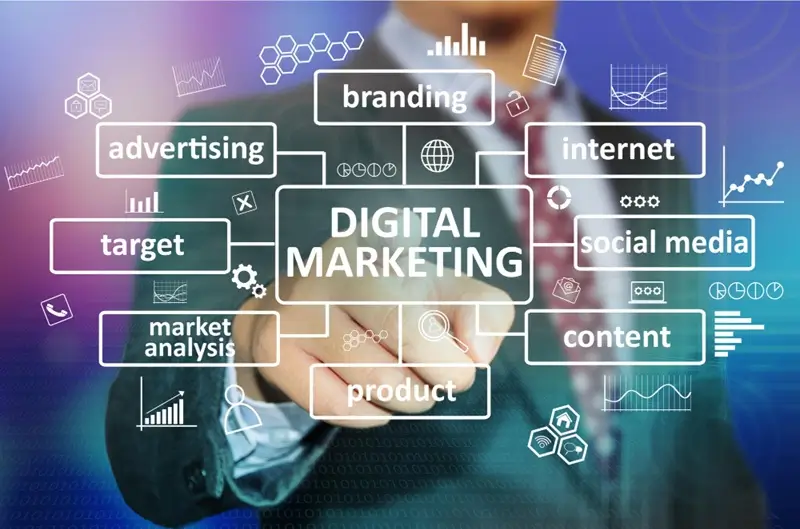
Why Social Media Matters to Businesses?
Businesses cannot succeed without social media in today's digital world. These social media sites - Facebook, Instagram, LinkedIn, and Twitter - have overcome personal relationships and become great marketing and business growth instruments. Social media looks after everything from establishing a brand position to current interactions of engaging customers to connect businesses with their audience.
Overview of Social Media's Impact on Business Development
The influence that social media exerts on business cannot be overstated. From what was initially designed to be just a medium used for personal sharing and communication, it has become that force which gives businesses a third push into commercial success. With social media, companies do not just have an avenue to promote their products and services; they can also connect directly with consumers, which means higher brand loyalty and market penetration.
Historical Background: The Emergence of Social Media
While social media was initially a way to connect with the individual, with the emergence of Facebook, Twitter, and Instagram, businesses soon realized the promotional side of social media. Early adopters received enormous advantages by establishing social media strategies tailored to where their audiences spent most of their time online. It is almost impossible to find a successful business today that doesn't leverage social media.
How Social Media Has Changed Modern Marketing
There is no more traditional marketing where firms have only run advertisements on television, billboards, or the radio. Instead, social media marketing offers a dynamic, low-cost means to reach the masses, measure impact instantly, and adjust strategies in real time based on user interaction and feedback.
Benefits of Using Social Media for Businesses
How to Establish Brand Awareness through Social Media
Its key benefit is that it builds brand awareness. Across a number of platforms, spreading billions of users, businesses have the most incredible opportunity to connect with their target populations. More frequent posting and targeted advertisements ensure that branding can stay top-of-mind for a potential customer.
Customer Interaction and Engagement Enhancement
Social media allows for direct access to the target market. Other than answering comments or resolving customer service issues, using polls or questions provokes a two-way conversation, hence giving a personal feel to the customers.
Generating Online Traffic and Conversion
Additionally, one major benefit is that it might bring some traffic to a business site. The sharing of content, deals, or even updates on social media will drive people to click through to the business websites where they could hope to find higher conversion rates or sales conversion rates.
Effective Ways of Social Platform Marketing Expenses
Social media marketing is relatively cheaper than all other forms of advertising. The ads can reach the targeted demographics at a relatively minimal cost compared to other forms of advertising. Secondly, any business through organic posting can reach out to their people even without showing any paid advertisements, hence beneficial for startups and small businesses.
Most Popular Social Media Sites for Business
Facebook: The Giant of Social Networks
Facebook continues to be a key player on social media, with over 2 billion active account holders. The company also provides advertisers with incredibly powerful tools combined with analytics and gives businesses opportunities to target specified audiences through their interests, behavior, or demographics.
Instagram: The Power of Visual Storytelling
Given that Instagram is so visual, it actually makes it the perfect place to use for ventures with business dealings in images. Its businesses include fashion, restaurants, and much more. Instagram is a great tool for companies that want to show their products in an engaging or creative light that goes right to the user.
LinkedIn: The Professional Network for B2B Companies
The medium for B2B companies is LinkedIn. With LinkedIn, businesses can connect with professionals, share industry insights, and have a robust network. It's even the reason why most of the B2B companies use this in generating leads and nurturing professional relationships.
Twitter: Fast-Paced Communication for Businesses
Twitter is fast-paced; hence it is suitable for any business interested in interacting with its audience in real-time. Sharing updates and responding to customers' questions and going viral by launching viral campaigns is made possible with the presence of Twitter.
YouTube and Video Marketing: The Interaction of the Audience
Video marketing is one of the best ways to get the attention of the target audience, and the leading site for video content is obviously YouTube. Any business that manages to develop interesting and informative content in video forms can engage viewers on different levels, create brand loyalty, and enhance their marketing engagement.
How to Build a Winning Social Media Strategy
Defining Clear Business Objectives for Social Media
A good point of beginning with a winning social media strategy is to create clear, measurable goals. Whether it be brand awareness, leads, or sales, having an obvious objective will help tailor the content and methodology of a business.
Who Do I Target and Where Do I Reach Them?
Not all social media sites are created equal, and each audience uses each platform in the same way. Businesses need to find where their target audience spends most of their time and then focus most of their efforts there to maximize their impact.
Content creation is the bottom line
Any social media strategy relies heavily on having the right content. Content that is engaging, relevant, and sharable is what attracts audiences and compels them to return time after time. That means blog posts, images or videos, memes, and polls.
Monitoring and Measuring Performance Metrics
No social media strategy is complete without regular analysis. Businesses track their KPIs for engagement, reach, and conversion rates. Analysis of such data helps businesses adjust their approaches for better performance.
Social Media Trends and Future Scoping
The Impact of AI on Social Media Marketing
Artificial intelligence is rapidly changing things within the realm of social media marketing. These AI-powered tools help businesses craft customized content, analyze audiences' behaviour, and even automate responses, so as to make their social media marketing stronger and more focused.
E-Commerce Integration on Social Platforms
Social commerce is showing an uptrend, with Instagram and Facebook embedding e-commerce functionalities for enabling direct sales from producers to final consumers without necessarily leaving the platform. This trend will most certainly continue as more businesses become aware of the ease of shopping socially.
Influencer Marketing: The Emerging Character of Business Promotion
In addition, the influencer marketing trend is also on the rise. Businesses can eventually reach a much larger audience with authentic messages using the leverage of social media influencers who have a huge following.
Challenges Facing Businesses on Social Media
Algorithm Changes and How It Affects Visibility
The constantly changing algorithms on social networking sites could be among the biggest problems that businesses face today. In short, these define how many people would view a posting done by a business, and it is of tremendous importance to monitor the change to avoid losing your visibility.
Controlling Negative Comments and Online Reputation
Negative talk and reviews snowball quickly on social media. Businesses must, therefore, have the strategy to deal professionally with negative comments and handle problems promptly before not sinking their reputation.
Maintaining Uniformity with Content Production
The thing with social media is that it has to be continuous. A business that does not post or communicate properly may lose its focus. However, maintaining a full post schedule is quite challenging to implement in small businesses.






